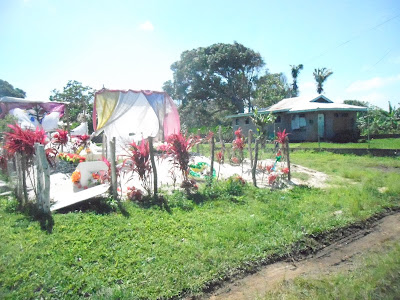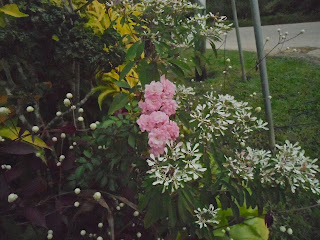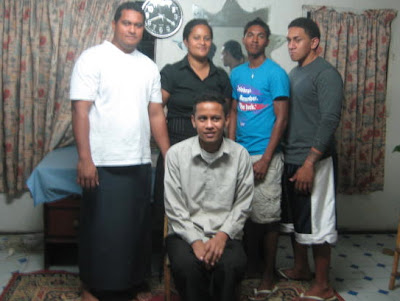 |
The entrance to Liahona High School, dedicated by LeGrand Richards in 1953.
Pretty impressive by any standards. |
 |
Because of the wet climate, concrete sidewalks
are everywhere. |
Liahona High School in Tonga is an interesting mix of
approaches and cultures, both in the way the organization is structured and in
the way that people relate to each other.
One of the most British features is that it functions as a boarding
school for about 80 of its students, who live in dormitories during the school
year. But imagine for a moment
going to a boarding school, when the only thing you know that is bigger than
your house is the ocean. You come
from a remote island, with very little exposure to even the still-developing
standard of living here on the “big” island of Tongatapu.
 |
Major walkways are shelters from the hot sun and torrential rains,
regular features in the tropics. |
So the shock of seeing concrete
buildings, paved roads and sidewalks is dizzying, much less the shock of
changing from family surroundings to a school of 1000 students. Thankfully, the shared culture of the
LDS Church helps students have an anchor here, and somehow they endure
challenges that would have overwhelmed me at their age.
 |
All students in Tonga wear school uniforms.
Liahona's colors are green and white, and
the two stripes represent the phrase
"by study and by faith,"the school motto. |
Take Selu (SAY-loo) for example. She comes from one of the other islands, a small island called
Ha’apai (Hah-ah-PIE). Her parents
struggle to provide her with money for tuition, and since the kitchen provides
two meals a day, breakfast and supper, Selu often goes without lunch, to save
money. But so do most of her
friends, unless they buy some Ramen noodles or share a loaf of bread, two of
the cheapest options for lunch at the store across the street from campus.
Selu spends the whole school year here, because her parents
can only afford to bring her home on the ferry at the end of the school year. So during the week-long breaks after
each quarter and semester, she stays with relatives here on Tongatapu. She misses her parents, especially her
mother, but accepts the reality of spending ten months a year away from
them.
Selu has “dorm parents” who try to support her, but she is
one of 40 girls in the dorm, so she has to create her own system of
support. Fortunately, the families
here at Liahona spend a great deal of time with the dorm students. Because of this support, and because of
the way some of her teachers have extended themselves to her, Selu has found
ways to succeed in school and be happy here.
 |
Boys all over the Pacific islands wear a type of
wrap-around skirt. In Tongan it is called a tupeno.
Much cooler than trousers. |
Sila (SEE-lah), one of the boys in the boys’ dorm, has had
to work harder to find success. He
struggles with his English, since no one in his family speaks English at home,
but he is expected to function in English during his classes. He wants to do well, but is often
frustrated with his lack of skills with the English language.
Sila’s dorm parents know that he is not the only boy who struggles. So they have established a new system
for the boys, assigning them in multi-age groups in rooms. That way, 14-year old Sila has some
older brothers in the dorm room with him.
These older brothers have
been trained to be guides and role models for Sila, and they take their
responsibilities seriously. Some
of them serve as district leaders, a term borrowed from Mormon missions.
District leaders are given the responsibility to make sure several room groups
are functioning properly – that boys are where they ought to be, that problems
are solved, that needs are addressed.
Sila’s older roommates help
him with his homework, teaching him the English words he needs to succeed. They help him read his assignments, but
they also spend ten minutes every morning and ten minutes every evening reading
scriptures together. They pray
together, in their small groups, and all the boys in the dorm meet at 7 am
every morning for a hymn, a prayer, and to share a spiritual thought.

Saturday morning is not an opportunity to sleep in, either. These dorm students are kept busy all week long. Twice a month, before sunrise, Sila and all the dorm students go together to the LDS temple to serve by performing vicarious baptisms for dead relatives, to offer their deceased ancestors the choice of accepting the fullness of the gospel in the spirit world, while they await resurrection. The feelings and experiences they share about the chance to serve their ancestors are deep and frankly, too sacred to share here. Just know that they come back from the temple happy.
On the other Saturday mornings, Sila and the other dorm boys
go out to the Church farm and work “on the plantation”. They usually spend about 4 hours there,
then they are granted the afternoon off.
And at church on Sunday, Sila is surrounded by older brothers, who make
sure he understands the lessons and feels the spirit of the messages he hears.
 I am amazed as I watch the dorm parents and their dorm
students, that a couple, with children of their own, would be willing to take
on an extra 40 children for ten months.
I smile as I watch the bonds of love that develop between these students
and their dorm parents, their teachers, and the families who connect with them
at church. One of the “golden
principles” of Tongan culture is love, and I see love in action every day here. Life is challenging wherever you go,
but because of their shared values, these teachers and students, these leaders
and young men and women, are taking on the challenges together.
I am amazed as I watch the dorm parents and their dorm
students, that a couple, with children of their own, would be willing to take
on an extra 40 children for ten months.
I smile as I watch the bonds of love that develop between these students
and their dorm parents, their teachers, and the families who connect with them
at church. One of the “golden
principles” of Tongan culture is love, and I see love in action every day here. Life is challenging wherever you go,
but because of their shared values, these teachers and students, these leaders
and young men and women, are taking on the challenges together.











































